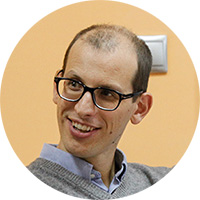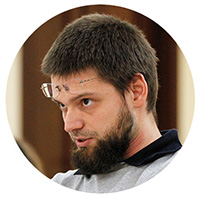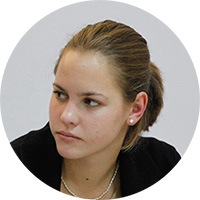‘Game of Thrones’ and ‘Lord of the Rings’ Prove Interest in Middle Ages
From October 7-9, the second annual ‘Dynamic Middle Ages’ school of young medievalists took place in Moscow. After its conclusion, participants talked about what they find interesting in the Middle Ages and the parallels they see between those times and today.
Reunification of the academic community
The ‘Dynamic Middle Ages’ training school took place for the first time in October 2012 on the initiative of Mikhail Boytsov, head of the Centre for Medieval Studies, and Professor Michael Borgolte of the Humboldt-University in Berlin. Nikolaus Katzer, Director of the German Historical Institute in Moscow, soon joined them.
Boytsov says that it was not long after the first school that he began to meet the young medievalists who had participated as presenters at the most reputable international conferences. This year, the school has new partners – the White Rose University Consortium and the Heinrich Heine University (Düsseldorf, Germany). It was therefore decided to hold the second ‘Dynamic Middle Ages’ in three phases: in 2014 in Moscow, in 2015 in Sheffield and/or Leeds, and in 2016 in Düsseldorf.
As noted by Boytsov, before World War I, medieval studies in Russia were in no way inferior to western European medieval studies. The two were actually at one with one another. This unity was broken for decades due to Soviet isolation. In recent years, Russia has again seen the emergence of experts who enjoy well-deserved recognition around the world. However, these phenomena are still at the individual level rather than the systemic.
‘The “Dynamic Middle Ages” is just the tool needed to reunify the academic community,’ says Boytsov. ‘Young historians from Russia have access to contemporary, world-class research methods, and their peers from other countries are aware of the serious potential of medieval studies in Russia, as well as the usefulness of learning eastern European history for their own scholarly research.’
Present another person’s project for 15 minutes
The school this year gathered 17 participants from universities in Bulgaria, Germany, Hungary, Italy, the Netherlands, Russia and the UK. Classes were led by eight teachers representing the HSE’s Centre for Medieval Studies, Heinrich Heine University, Humboldt University in Berlin, the University of Mannheim, the University of Leeds and Bielefeld University. The school was also attended by researchers from Austria, Taiwan and the U.S.
Classes were held in the form of lectures by professors and discussions of graduate students’ dissertation projects. Professors’ presentations focused on a particular aspect of medieval culture and society that is particularly close to their own research. This served as a way for graduate students to be introduced to their professors’ research interests, favourite sources and research methods.
After the lectures, analysis of dissertation projects began. What was unusual was that projects were presented not by their authors, but rather by other graduate students who study quite different subjects. Presenters had 15 minutes to accurately describe the content of the future dissertation, highlight its strengths, formulate questions to the candidate, point out places where the research was controversial, and, as much as possible, give advice. The author was given five minutes to respond to questions and comments, which was followed by discussion with other students and professors. Everyone joined together to identify conceptual weaknesses, provide useful recommendations on methodology and fill gaps in the historiography of the question under discussion.
‘Students showed great interest and asked very substantive questions,’ said Professor Annette Kehnel of the University of Mannheim, who participated in the ‘Dynamic Middle Ages’ for a second time. ‘Studying the Middle Ages is really difficult, because you have to learn ancient languages, but people dedicate themselves to it.’
Hypnotic power
What attracts students to the Middle Ages? ‘I think it’s some sort of attraction of another culture with the distance in time rather than with the distance in place,’ said Professor Kehnel. ‘It’s a bit like ethnology. They have a chance to study a foreign culture which is a long time back but it allows us insights into ourselves at the same time.’
Mikhail Boytsov agrees with her assessment. ‘The Middle Ages are truly hypnotic. A number of generations of European historians who have worked since the 16th century on the image of the Middle Ages have invested so much in their own hopes, fears and illusions that now almost everyone can find something attractive in it, if not to admire, then at least to tickle the nerves,’ he says. ‘It comes as no surprise that the “demand” among students for the Middle Ages over the last several decades has been quite stable.’
Interest in the Middle Ages is most evident from the fact that today's mass commercial products use medieval imagery, says Boytsov. ‘Lord of the Rings’ and ‘Game of Thrones’ cannot be called historical films, but they are saturated with references to the Middle Ages. Of course, the Middle Ages of popular culture is not the same thing as the Middle Ages for a professional medievalist, but they are not isolated from one another. Historians are not closed off in their academic world.
Why the Middle Ages? What’s so interesting? Here’s what the young medievalists themselves had to say.

Pietro Delcorno (Radboud University Nijmegen, Netherlands), studies medieval religious history
I find it interesting how our society has evolved, and to take a critical look at what we see around us. People living in western Europe in the Middle Ages acted and thought very differently from how we do today, but that time is closely linked to many elements of modernity, and this relationship can give us some ideas for the future and for critical perception of the present. We are too focused on the ‘now’ and are losing our sensitivity.
Here is just one example of the connection of the Middle Ages to our lives - western European cities. Last year I was in South Africa and Brazil, and the difference in the relationship between people and territories in these regions versus in Europe is striking. There they have young cities and long distances; here there are very old towns every 40 kilometres. This is the legacy of the Middle Ages.

András Kraft (Central European University), studies the history of Byzantium
Since I was a kid, I have always liked that history. The Middle Ages are a personal passion. I like understanding the underlying factors about what’s happening today. Especially interesting is the continuity between Byzantium, which I study, and Russia. If you look at the modern West, its relationship with the Middle Ages is not as obvious, but it is still there, and lies, for example, in the continuity of the understanding of rationality, in the perception of what kind of state there should be, or, say, in such phenomena as anti-Semitism or religious persecution. After all, these were born in western Europe during the High Middle Ages.
The Middle Ages offer a lot of research topics. Antiquity and the history of the ancient world have more or less been studied, but in the Middle Ages there are still a number of gaps.

Svetlana Yatsyk, postgraduate student in the HSE’s Faculty of History, studies religious rationality and sanctity in the medieval West
For me, the Middle Ages are interesting because there are a lot of myths that put it in a negative light. My inner fighter for the truth makes me look for reasons to ‘rehabilitate’ the Middle Ages. For example, I try to show that in addition to modern Western rationality, which Max Weber wrote so much about, there were other formats for full-fledged rational thinking. For example, scholasticism combined Christian theology with the ancient natural philosophy and logic.
.jpg)
Daria Safronova, postgraduate student in the Faculty of History at Lomonosov Moscow State University, studies the political history of Spain in the early Middle Ages
I do not deny the parallels between the Middle Ages and modernity, but history is interesting to me primarily due to the fact that it involves ‘discovery of the other.’ In the Middle Ages, the perspective on phenomena that seem timeless was very different from what the modern perspective. We will hardly learn to think in the same way as people in other times thought, but in breaking stereotypes of thinking, it’s possible that we may see an alternative experience. For me it is an intellectual exercise.
Maria Glazyrina, fourth year student of the Faculty of Law, intern for the HSE News Service
Mikhail Boytsov
See also:
'The Past Always Remains a Part of the Present'
Sergey Medakin began his career as an art historian by studying Sabaton, a Swedish power metal band, and is now focusing on German studies. In this interview with the HSE Young Scientists project, he discusses his favourite Soviet and Western political cartoons, the scientific conference he founded, and the relevance of the past in modern culture.
‘We Cannot Understand the Modern Ideological Confrontation without the Accusations that Emerged during the Lausanne Process’
Rainer Matos Franco, from Mexico, defended his PhD thesis with honours at HSE University this June. In his dissertation, Rainer Matos Franco examines the history of anticommunism in Europe during the 1920s. The HSE News Service spoke with Rainer and his academic supervisor, Tatiana Borisova, about the significance of the Lausanne Process for the Cold War and contemporary history, the opportunities provided by HSE University for international PhD candidates, and the challenges of working with a vast database of historical sources.
How the Telephone Conquered the World. Episode Ten: 'Number, Please?'
The history of the invention of telephony reads like a captivating detective novel, but even more intriguing are the events that contributed to the worldwide adoption of this technology. In this series of columns on IQ.HSE, Anton Basov, HSE Faculty of Computer Science editor, discusses how telephones have become an integral part of our everyday life. The final episode of the series recounts how men were unable to cope with telephone operator jobs and were replaced by tall and polite young women. However, as telephone networks expanded, the role of the intermediary became unproductive, eventually rendering the switchboard operator profession obsolete due to automation—not the first nor the last time such a thing has happened. As for Alexander Graham Bell, he used the earnings from inventing the telephone to promote science, educate people about the world around us, and pursue new inventions.
How the Telephone Conquered the World. Episode Nine: Big Connections
The history of the invention of telephony reads like a captivating detective novel, but even more intriguing are the events that contributed to the worldwide adoption of this technology. In this series of columns on IQ.HSE, Anton Basov, HSE Faculty of Computer Science editor, discusses how telephones have become an integral part of our everyday life. The ninth episode of the series explores the development of the first long-distance, interstate, and transatlantic telephone lines, which suddenly made people thousands of kilometres away feel as close as if they were in the same room together.
How the Telephone Conquered the World. Episode Eight: The Russian Field of Experiments
The history of the invention of telephony reads like a captivating detective novel, but even more intriguing are the events that contributed to the worldwide adoption of this technology. In this series of columns on IQ.HSE, Anton Basov, HSE Faculty of Computer Science editor, discusses how telephones have become an integral part of our everyday life. The eighth episode of the series recounts how Russia first adapted the telephone for military and logistical purposes, created a shell company headed by a nominal executive for reselling the rights to Western competitors, and intensively developed communication infrastructure in the country's two capitals, making such progress that Vladimir Lenin insisted on capturing and maintaining control of telephone exchanges at all costs.
How the Telephone Conquered the World. Episode Seven: German Efficiency
The history of the invention of telephony reads like a captivating detective novel, but even more intriguing are the events that contributed to the worldwide adoption of this technology. In this series of columns on IQ.HSE, Anton Basov, HSE Faculty of Computer Science editor, discusses how telephones have become an integral part of our everyday life. The seventh episode in the series recounts the story of German bureaucrats, who proved to be the most astute in Europe by ensuring effective telephony first for themselves and subsequently for all major cities in Germany. However, even there, the government's dominant role over the free market slowed down the adoption of the new technology.
How the Telephone Conquered the World. Episode Six: The Telephone's Misadventures in France
The history of the invention of telephony reads like a captivating detective novel, but even more intriguing are the events that contributed to the worldwide adoption of this technology. In this series of columns on IQ.HSE, Anton Basov, HSE Faculty of Computer Science editor, discusses how telephones have become an integral part of our everyday life. The sixth episode of the series recounts events in France when the private owner of the telephone network was compelled to sell it to the government at a knockdown price, and the impact it had on the development of communications in the country. Spoiler alert: the impact, naturally, was detrimental.
How the Telephone Conquered the World. Episode Five: From the US Free Market to Conservative Britain
In this series of columns on IQ.HSE, Anton Basov, HSE Faculty of Computer Science editor, discusses how telephones have become an integral part of our everyday life. The fifth episode of the series chronicles the early experiences of the telegraph and telephone in Great Britain, shedding light on the challenges they faced, and explores the adverse impact of excessive government regulation and nationalisation on the evolution of telecommunications.
Peacocks, Pepper, and Petrol: The Early History of Imports from Asia
Petroleum for equine care, wood oil for lighting, sandalwood for Easter celebrations, and lemons and olives for entertaining unexpected guests. Russian monasteries often used these and other eastern goods in the period leading up to and during the reign of Peter the Great. Analysing their account books leads to a revision of the traditional assumptions about the primary consumers of oriental goods in Russia. These consumers, in addition to the royal and aristocratic circles, included monastery estates, as discussed in the paper ‘“Three altyns worth of petroleum…”: Oriental goods in Russia at the second half of the 17th and early 18th century’ by historian Arthur Mustafin of HSE University. Based on his paper, IQ.HSE explores the types of goods that were shipped from the East to Russia in the latter half of the 17th to the early 18th century, including the routes and purposes of these shipments.
How the Telephone Conquered the World. Episode Four: David the Start-up Versus the Corporate Goliath
The history of the invention of telephony reads like a captivating detective novel, but even more intriguing are the events that contributed to the worldwide adoption of this technology. In this series of columns on IQ.HSE, Anton Basov, HSE Faculty of Computer Science editor, discusses how telephones have become an integral part of our everyday life. The fourth episode of the series recounts the story of the fledgling start-up's confrontation with hordes of patent trolls and its subsequent victory in a full-blown corporate war against the largest telecommunications company of the late 19th century.


